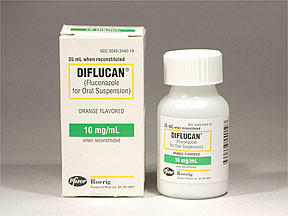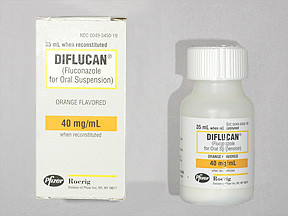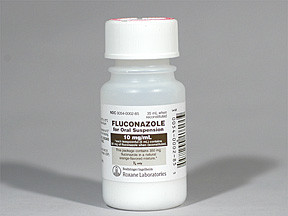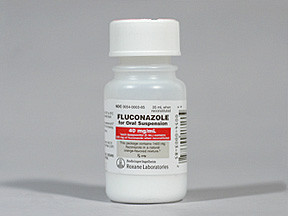FLUCONAZOLE - ORAL
PHONETIC PRONUNCIATION: (floo-KON-a-zole)
COMMON BRAND NAME(S): Diflucan
GENERIC NAME(S): fluconazole
Uses
USES: Fluconazole is used to prevent and treat a variety of fungal and yeast infections. It belongs to a class of drugs called azole antifungals. It works by stopping the growth of certain types of fungus.
How to use FLUCONAZOLE - ORAL
HOW TO USE: Read the Patient Information Leaflet if available from your pharmacist before you start taking fluconazole and each time you get a refill. If you have any questions, ask your doctor or pharmacist. Take this medication by mouth with or without food as directed by your doctor, usually once daily. If you are taking the liquid suspension form of this medication, shake the bottle well before each dose. Carefully measure the dose using a special measuring device/spoon. Do not use a household spoon because you may not get the correct dose. Dosage is based on your medical condition and response to treatment. For children, dosage is also based on weight. Generally in children, the dose should not exceed 600 milligrams daily unless directed by the doctor. This medication works best when the amount of medicine in your body is kept at a constant level. Therefore, take it at the same time each day as directed. Continue to take this medication until the full prescribed amount is finished, even if symptoms disappear after a few days. Stopping the medication too early may allow the fungus to continue to grow, which may result in a return of the infection. Tell your doctor if your condition persists or if it worsens.
Side Effects
Precautions
Interactions
Overdose
Images
Reviews
Faq for FLUCONAZOLE - ORAL
Fluconazole is an antifungal medication that is used to treat and prevent certain types of fungal infections.
Fluconazole works by stopping the growth of the fungi causing the infection. It does this by interfering with the formation of the fungal cell membrane, leading to the leakage of essential cell components and ultimately killing the fungus.
Fluconazole can be used to treat various fungal infections, including vaginal yeast infections, oral thrush (candidiasis), esophageal candidiasis (fungal infection in the throat), urinary tract infections, and various systemic fungal infections.
Fluconazole is generally taken orally, with or without food, as directed by your doctor. The dosage and duration of treatment will depend on the specific infection being treated. It is important to complete the full course of treatment, even if symptoms improve.
Common side effects of fluconazole may include nausea, headache, stomach pain, diarrhea, and dizziness. Serious but rare side effects may include severe allergic reactions, liver problems, and irregular heartbeats. It is important to seek medical attention if you experience any severe or persistent side effects.
Yes, fluconazole can interact with several other medications, including warfarin (blood thinner), certain anticonvulsants, and certain cholesterol-lowering medications. It is essential to inform your doctor about all the medications you are taking to avoid any potential drug interactions.
Fluconazole should be used during pregnancy only if clearly needed, as it may harm an unborn baby. It is important to discuss the potential risks and benefits with your doctor. Fluconazole passes into breast milk, so it is advised to consult a healthcare professional before using it while breastfeeding.
The time it takes for fluconazole to work will vary depending on the specific infection being treated. In some cases, relief of symptoms can be seen within one to three days, while other infections may require several weeks of treatment.
Yes, fluconazole can be prescribed to prevent certain fungal infections in individuals with weakened immune systems or at high risk of developing fungal infections, such as those undergoing chemotherapy or organ transplantation.
Disclaimer
IMPORTANT: HOW TO USE THIS INFORMATION: This is a summary and does NOT have all possible information about this product. This information does not assure that this product is safe, effective, or appropriate for you. This information is not individual medical advice and does not substitute for the advice of your health care professional. Always ask your health care professional for complete information about this product and your specific health needs.







For : Fluconazole helped with a fungal issue I was dealing with for a while. Would recommend.
By Bailey on 17 Jul, 2023